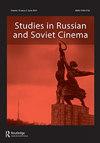Little Big and the viral Gesamtkunstwerk
IF 0.4
0 FILM, RADIO, TELEVISION
引用次数: 0
Abstract
ABSTRACT In an interview, Il’ia Prusikin, the founding member of the punk-rave group Little Big, confessed that he has always loved to ‘confound expectations’. The creative evolution of Little Big has succeeded in confounding expectations, if not astonishing. Initially dubbed ‘the most disgusting group in Russia’ for their sexually suggestive and grotesque music videos such as ‘Big Dick’ and ‘Give me Your Money’, Little Big’s recent cycles ‘Antipositive’ and ‘Uno’ are distinguished by their densely comedic audiovisuality that harkens back to Russian modernist theatrical (notably Vsevolod Meyerhold) and gag cinema traditions. The audio, by contrast, consists of irresistible dance tracks and lyrics that combine largely nonsensical polyglot phrases with animal sounds for the ultimate lyrical realisation of Aleksei Kruchenykh’s zaum. Little Big’s signature complex of comic audio-visual devices is a means of what the Russian formalist critic Viktor Shklovskii referred to as ostranenie (defamiliarization): it surprises and cognitively challenges the viewer, and ultimately coalesces into a distinctive posthuman aesthetics. From ‘Skibidi’ to ‘Tacos’, Little Big deploys these devices as a form of soft stiob for the purpose of parody of the music video tradition, but principally to create a universalist and therefore viral style that transcends national borders.小胖和流行的艺术艺术
在一次采访中,朋克锐舞组合Little Big的创始成员Il ' ia Prusikin承认,他一直喜欢“颠覆人们的期望”。Little Big的创造性演变成功地颠覆了人们的预期,如果不是令人惊讶的话。最初被称为“俄罗斯最恶心的团体”,因为他们的性暗示和怪诞的音乐视频,如“大迪克”和“给我你的钱”,小大个子最近的周期“反积极”和“Uno”以其浓重的喜剧视听效果而闻名,这让人想起了俄罗斯现代主义戏剧(尤其是弗塞沃洛德·梅耶霍尔德)和搞笑电影传统。相比之下,音频则由令人无法抗拒的舞曲和歌词组成,这些歌词结合了大量荒谬的多语言短语和动物的声音,最终抒情地实现了阿列克谢·克鲁琴科的《zaum》。Little Big标志性的喜剧视听设备情结是俄罗斯形式主义评论家Viktor Shklovskii所说的“陌生化”(ostranenie)的一种手段:它给观众带来惊喜,并在认知上挑战观众,最终融合成一种独特的后人类美学。从“Skibidi”到“Tacos”,Little Big将这些装置作为一种软广告形式,目的是模仿音乐视频传统,但主要是为了创造一种超越国界的普遍主义和病毒式风格。
本文章由计算机程序翻译,如有差异,请以英文原文为准。
求助全文
约1分钟内获得全文
求助全文

 求助内容:
求助内容: 应助结果提醒方式:
应助结果提醒方式:


